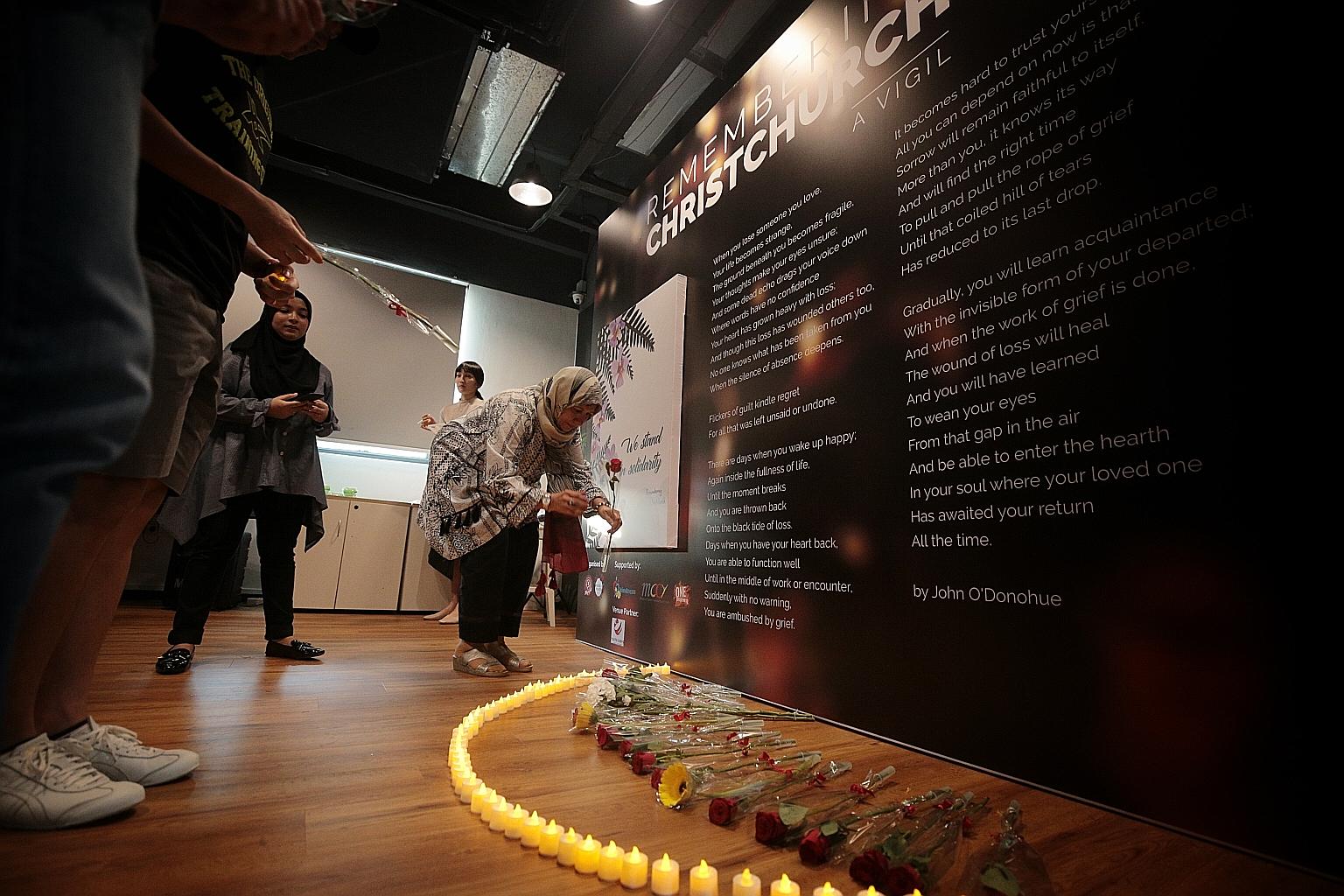New Zealand attacks show Singapore cannot take harmony for granted: Grace Fu
Radicalisation can be present in any race or religion, says minister
Sign up now: Get ST's newsletters delivered to your inbox

Ms Nafisa Kapadia, 61, placing a flower during a vigil at The Red Box in Somerset Road yesterday in memory of the Christchurch attack victims.
ST PHOTO: JASON QUAH
As Singaporeans held a vigil yesterday for the 50 victims shot and killed in the March 15 attacks on two mosques in Christchurch, Minister for Culture, Community and Youth Grace Fu said the attacks were a stark reminder of how Singapore's social harmony should never be taken for granted.
It is a shared responsibility, especially with the rise of identity politics and online threats, she said in a keynote speech at a youth forum organised by interfaith group Roses of Peace, where she also expressed concern about the results of a recent survey that found young Singaporeans to be comfortable with extremist views being posted online.
The vigil, held afterwards at The Red Box in Somerset Road, drew more than 50 attendees including Ms Jo Tyndall, the New Zealand High Commissioner to Singapore.
The fact that the perpetrator of the Christchurch mosque attacks was influenced by far-right white supremacist beliefs demonstrates how radicalisation can be present in any race or religion, Ms Fu said at the forum, at the OnePeople.sg office in Toa Payoh.
As more people identify themselves along narrow ethnic, cultural and religious lines, there is a risk that groups will try to maximise their space and influence at the expense of others, she noted.
This has led to conflict and discord in other territories, and must not be the path for Singapore, she cautioned, where the Government wishes for every Singaporean the right and freedom to practise his or her belief of choice.
"Every person or group has to be accommodating. It may mean giving up a bit of one's own space and comfort for others, but in return other groups do the same for the practice of our own beliefs."
She said the findings of a recent Institute of Policy Studies survey, which showed that nearly one in two young Singaporeans would allow religious extremists to publish their views online, are "worrying".
This is because extreme online sentiments can affect real-world relationships and perceptions.
"Frequent posting of extreme views, if left unchecked, will normalise such views and, over time, make them mainstream. Singaporeans must hence be discerning about messages that propagate prejudice relating to race and religion and take a stand against such hatred and prejudices," said Ms Fu, as she urged young people to think about how to leverage online space to strengthen Singapore's social cohesion.
Citing the example of a video of New Zealand students performing a haka, a ceremonial Maori dance, in tribute to the Christchurch victims, Ms Fu said the Internet and social media can instead be used to build relationships and foster respectful exchanges of viewpoints.
In a digital age, the impact of terrorism is also amplified, said Ms Fu, pointing to how the Christchurch attacker had published his views online before the killings and even live-streamed the attacks.
"Online disinformation and falsehoods are insidious to our multiracial, multi-religious society. When we see or hear news on disputes relating to religious and racial prejudice... we should actively check the accuracy of the sources, and seek clarification from religious or community leaders," she said.
Mr Divian Nair, who heads the We Are Majulah team, said the vigil was organised as the group wanted a space where the Muslim community and everybody in Singapore could come together to reflect.
"The funny thing about pain is that it has a large propensity to turn into fear, into anger, and it can cause divisive lines in societies that we live in. At the end of the day, what we believe... is that pain also can be converted into empathy."
Yesterday, President Halimah Yacob also announced that the first international conference in Singapore on social cohesion and interfaith harmony will take place from June 19 to 21 at the Raffles City Convention Centre.
The International Conference on Cohesive Societies will bring together local and international thought leaders across academia, government, religious groups and the civic sector to share their experiences and ideas, as well as collaborate and encourage people to rally their own communities to develop social cohesion, she said.
"(The conference aims to) ensure that we strengthen trust among the communities and this is important because we saw what happened in Christchurch, therefore we cannot overemphasise the importance of cohesion and harmony," said Madam Halimah, speaking on the sidelines of her visit to the Chinese Development Assistance Council at Tampines.
SEE TOP OF THE NEWS


